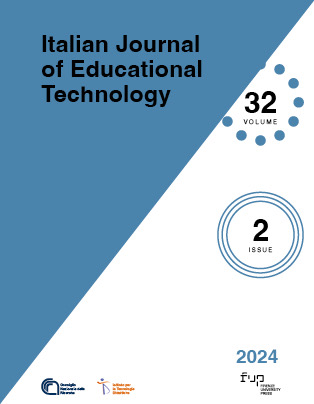Questionnaire for assessing the digital competence of future teachers
Main Article Content
Abstract
This study presents the preliminary stages of a validation process for a questionnaire developed to assess the digital competencies of future teachers at the University of Bologna, focusing on students in the Pedagogy, Primary Education, and Early Childhood Education programs at the Giovanni Maria Bertin Faculty. Given the increasing importance of technology in various fields, measuring digital competencies is essential for future educators. The questionnaire, based on the “Cuestionario de Competencia Digital para Futuros Maestros” (CCDFM) by Cabero-Almenara et al. (2020), was adapted to Italian. The preliminary validation process described in this paper encompassed cultural adaptation, expert review, and a pilot test. To ensure data reliability, analytical techniques like Cronbach's alpha, KMO, and Bartlett's tests were used. Factor analysis and rotation were conducted to examine item structures, alongside factor loading tests. In a context where technology integration in education is essential, this tool promises to enhance teacher preparation and refine digital competency assessment methods. The results underscore its relevance for education professionals and researchers, confirming its potential to improve teacher training practices and broader research on digital competencies.
Article Details
Section

This work is licensed under a Creative Commons Attribution 4.0 International License.
Authors who publish with this journal agree to the following terms:
- Authors retain copyright and grant the journal right of first publication with the work simultaneously licensed under a Creative Commons CC BY 4.0 Attribution 4.0 International License.
- Authors are able to enter into separate, additional contractual arrangements for the non-exclusive distribution of the journal's published version of the work (e.g., post it to an institutional repository or publish it in a book), with an acknowledgement of its initial publication in this journal.
- Authors are permitted and encouraged to post their work online (e.g., in institutional repositories or on their website) prior to and during the submission process, as it can lead to productive exchanges, as well as earlier and greater citation of published work (See The Effect of Open Access)
References
Cabero-Almenara, J., Barroso-Osuna, J., Gutiérrez-Castillo, J. J., & Palacios-Rodríguez, A. (2020). Validación del cuestionario de competencia digital para futuros maestros mediante ecuaciones estructurales. Bordón. Revista De Pedagogía, 72(2), 45-63. https://doi.org/10.13042/Bordon.2020.73436
Calvani, A. (2013). ICT in schools: Ten recommendations for policy makers. Form@re-Open Journal for Networked Education, 13(4), 30-46.
Carretero, S., Vuorikari, R., & Punie, Y. (2017). DigComp 2.1: The digital competence framework for citizens with eight proficiency levels and examples of use. Publications Office of the European Union. https://doi.org/10.2760/38842
Chaw, L. Y., & Tang, C. M. (2022, October). The relative importance of digital competencies for predicting student learning performance: An importance-performance map analysis. In 21st European Conference on e-Learning ECEL 2022 (p. 61).
Crompton, H. (2017). ISTE standards for educators: A guide for teachers and other professionals. International Society for Technology in Education.
Garzón-Artacho, E., Sola-Martínez, T., Romero-Rodríguez, J. M., & Gómez-García, G. (2021). Teachers' perceptions of digital competence at the lifelong learning stage. Heliyon, 7(7),.https://doi.org/10.1016/j.heliyon.2021.e07513
Hatlevik, O. E., Throndsen, I., Loi, M., & Gudmundsdottir, G. B. (2018). Students' ICT self-efficacy and computer and information literacy: Determinants and relationships. Computers & Education, 118, 107-119. https://doi.org/10.1016/j.compedu.2017.11.011
Hernández González, O. (2021). Aproximación a los distintos tipos de muestreo no probabilístico que existen. Revista Cubana de Medicina General Integral, 37(3). http://scielo.sld.cu/scielo.php?script=sci_arttext&pid=S0864-21252021000300002
Instefjord, E. J., & Munthe, E. (2017). Educating digitally competent teachers: A study of integration of professional digital competence in teacher education. Teaching and Teacher Education, 67, 37-45.
Martínez Ramírez, J. L. (2019). El proceso de elaboración y validación de un instrumento de medición documental. Acción y Reflexión Educativa, 44(2019), 50-63. https://revistas.up.ac.pa/index.php/accion_reflexion_educativa/article/view/673
Méndez, V. G., Suelves, D. M., Méndez, C. G., & Ramon-Llin, J. A. (2023). Future teachers facing the use of technology for inclusion: A view from the digital competence. Education and Information Technologies, 28, 9305-9323. https://doi.org/10.1007/s10639-023-11649-w
Ministerio de Asuntos Económicos y Transformación Digital. (2021). Plan Nacional de Competencias Digitales.
Napal Fraile, M., Peñalva-Vélez, A., & Mendióroz Lacambra, A. M. (2018). Development of digital competence in secondary education teachers' training. Education Sciences, 8(3), 104.
O'Dwyer, L. M., & Bernauer, J. A. (2014). Quantitative research for the qualitative researcher. SAGE Publications. https://doi.org/10.4135/9781452270114
Parra-González, M. E., López-Belmonte, J., Segura-Robles, A., & Moreno-Guerrero, A. J. (2021). Gamification and flipped learning and their influence on aspects related to the teaching-learning process. Heliyon, 7(2), e06254. https://doi.org/10.1016/j.heliyon.2021.e06254
Ranieri, M. (2022). Teachers' digital competencies. In The direct digital integrated apprenticeship (TDDI). The experimental project for the development of teachers' and teachers' skills (pp. 49-60). Florence University Press.
Redecker, C. (2017). European framework for the digital competence of educators: DigCompEdu. Luxembourg: Publications Office of the European Union. https://doi.org/10.2760/159770
Riquelme-Plaza, I., Cabero-Almenara, J., & Marín-Díaz, V. (2022). Validation of the digital teaching competence questionnaire in Chilean university teachers. Revista Electrónica Educare, 26(1), 1-15. https://doi.org/10.15359/ree.26-1.22
Streiner, D. L., & Norman, G. R. (1995). Health measurement scales: A practical guide to their development and use. Oxford Medical Publications.
Tammaro, R., Iannotta, I. S., & Zanazzi, S. (2020). Assessing digital competence: A review of assessment practices in Primary Teacher Education degree programs. Form@re - Open Journal Per La Formazione in Rete, 20(1), 187-202. https://doi.org/10.13128/form-8744
Tsankov, N., & Damyanov, I. (2019). The digital competence of future teachers: Self-assessment in the context of their development. International Journal of Interactive Mobile Technologies (iJIM), 13(12), 4-18. https://doi.org/10.3991/ijim.v13i12.11004
Vaske, J. J., Beaman, J., & Sponarski, C. C. (2017). Rethinking internal consistency in Cronbach's alpha. Leisure Sciences, 39(2), 163-173. https://doi.org/10.1080/01490400.2015.1127189

